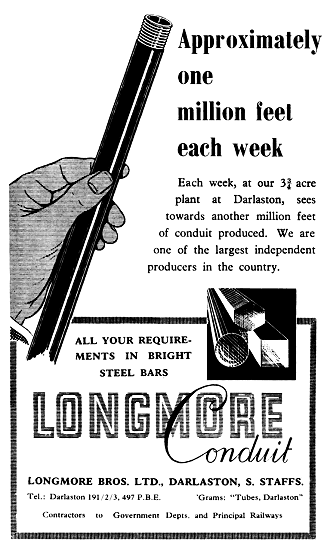|
Longmore Brothers factory stood in
Mill Street from the 1920s until the recent building of
the Woods Bank Estate. All that survives today are the
remains of the old weighbridge. Its tall chimney could
be seen for miles around. The company produced conduit
and bright steel bars, initially on the site between
Mill Street and Dorsett Road School. When the school
closed in the late 1930s, Longmores acquired the school,
and extended their site to cover over 3¾ acres.
The steel conduit was produced in
diameters up to 3 inches, and black enamelled in the
enamelling plant. Originally workers had to be rubbed
down with white spirit at the end of each working day,
and be given a hot bath to remove the enamel, which
stuck tightly to their skin. The old plant was
eventually updated so that this procedure became a thing
of the past.
Longmore’s factory became one of
the most up-to-date of its kind in the country, and
produced around one million feet of conduit each week.
In a single working shift the enamelling plant could
handle over 150,000 feet of conduit. Longmore Brothers
became one of the largest independent manufacturers of
steel conduit to B.S.I. standards. Conduit was supplied
for electrical installations, and to car, cycles, and
general engineering industries. The company’s bright
steel bars were supplied to the car industry, and
industry in general. They were made in various sections
including round, square, and hexagonal. |

An advert from the mid 1950s. Courtesy of
Christine and John Ashmore. |